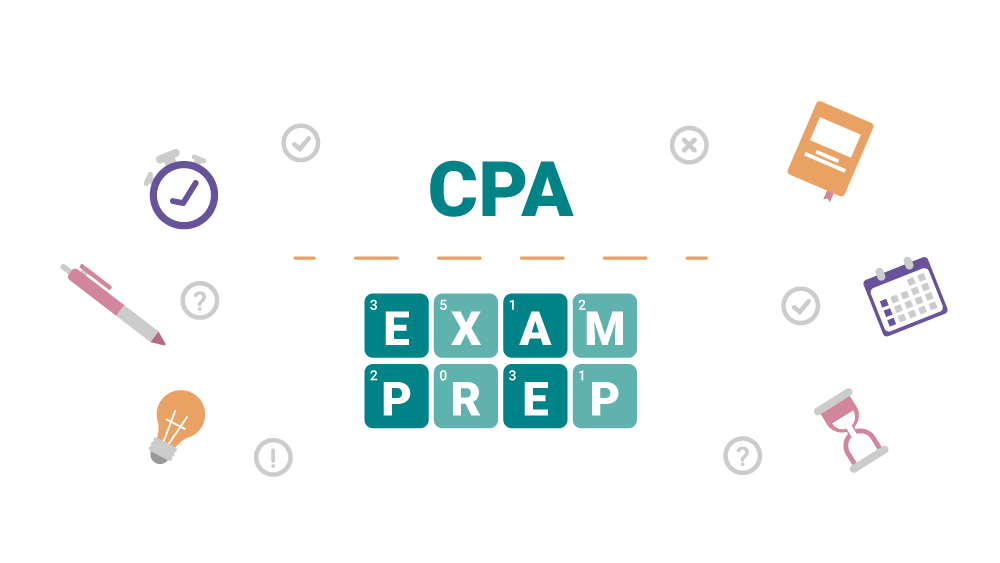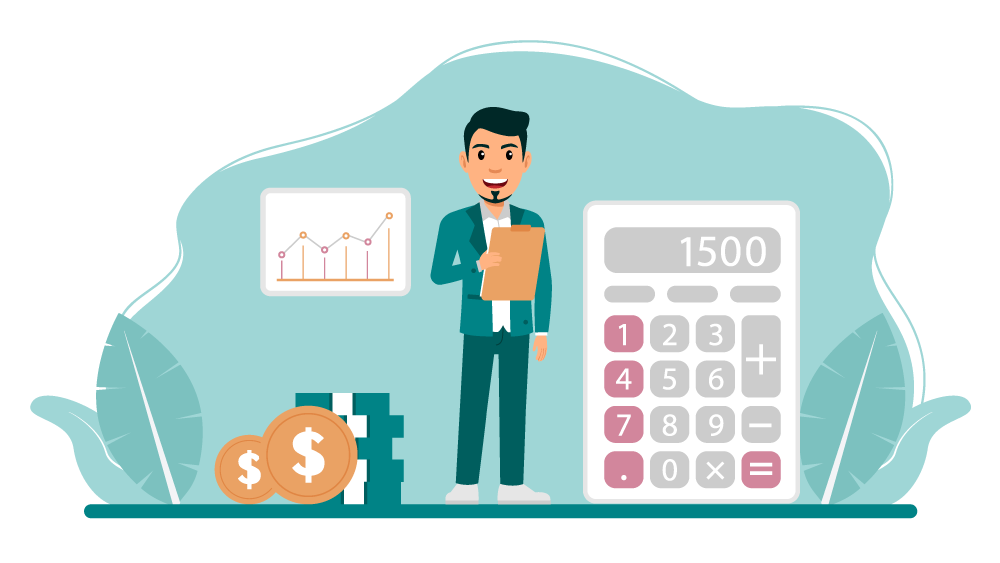The certified public accountant (CPA) designation is given to accountants who pass the Uniform CPA Examination. It’s possible to become an accountant without being a CPA, but the designation often brings prestige and benefits. The American Institute of Certified Public Accountants (AICPA) awards the designation to encourage professional standards across the accounting industry.

Before Taking the CPA Exam
Accountants who want to become certified must first meet the educational requirements for their state. Every state has its own requirements for becoming a CPA. Candidates for the CPA designation must make sure to learn the specific requirements for their state.
For example, Alabama requires CPA candidates to have at least 150 semester hours and a bachelor’s degree from an accredited university or college. A degree in accounting or a related field is strongly preferred.
Also, in Alabama, 33 of the 150 semester hours must come from upper-level accounting courses. And at least 27 semester hours must come from non-accounting courses, such as business law, marketing, economics, communications, and business ethics.
Alabama also requires CPA candidates to have one year of full-time employment as a staff accountant at a public accounting firm. An alternative is to have two years of full-time employment as an accountant for a business, the government, or teaching for a college or university.
But a different state can have different CPA requirements. Take Colorado, for example. Colorado also requires CPA candidates to have at least a bachelor’s degree from an accredited university or college. But Colorado requires a different set of courses for CPA candidates.
In Colorado, CPA candidates must have a minimum of 150 hours of coursework, with at least 33 semester hours of accounting courses. The courses must include topics such as accounting ethics, accounting information systems, accounting theory, accounting information systems, fraud examination, and taxation.
Colorado also requires additional courses in auditing, business ethics, and US Generally Accepted Auditing Standards (US GAAS).
As for CPA candidate experience, Colorado requires candidates to have at least 1,800 hours gained from working as an accountant in an accounting firm or other business.
The 1,800 hours must come from at least one year of work, but not more than three years. And a working CPA with knowledge of the candidate’s work must verify the hours.
As with Colorado and Alabama, each state has its own CPA requirements. CPA candidates should check with their state to verify local requirements.
About the CPA Exam
The CPA exam contains three writing sections, 324 multiple-choice questions, and 20 task-based simulation questions.
The exam is divided into four sections:
- Auditing and Attestation (AUD)
- Financial Accounting and Reporting (FAR)
- Regulation (REG)
- Business Environment and Concepts (BEC)
The four parts of the exam are taken individually. And candidates choose the order to take the CPA exam sections. One candidate might choose to start with REG, while another candidate might prefer to start with FAR.
After passing the first section of the exam, candidates have 18 months to complete the remaining three exam sections.
The American Institute of CPAs (AICPA) is in charge of administering and scoring the exam. Each part of the exam is graded on a scale of 0 to 99, and CPA candidates must score at least a 75 on each section to receive a passing score.
The exam questions are weighted, which means some questions are worth more points than others. Multiple-choice questions are 70 percent of the score, writing sections are 10 percent of the score, and simulation questions make up the remaining 20 percent.
Candidates must score at least 75 on each section of the exam. Multiple-choice questions are worth 70 percent. If a candidate gets a perfect score on the multiple-choice questions and fails everything else, they will fall five points short of a passing grade.
CPA Review Courses
No one ever said the CPA exam was easy. In fact, it’s not easy at all. The AICPA reports that more candidates fail than pass the four parts of the exam. In 2008, fewer than 50 percent of the candidates passed all four parts of the exam.
Instead of feeling discouraged, candidates should prepare for the exam well in advance. CPA review courses are an option for candidates preparing for the exam.
Choosing a CPA Review Course
There are dozens of CPA review courses available. Shopping around and reviewing several courses is a wise decision.
Before enrolling in a course, candidates should find out the CPA exam pass rate of past students. The exam scores of past students often reflect the effectiveness of the program.
Candidates should also consider which type of learning style suits them best. Candidates who learn best by watching videos should consider a course that provides video instruction. But candidates who learn best by reading might prefer a course that comes with books and other printed materials.
However, most CPA review courses are a combination of learning styles. For example, most online courses include textbooks, study materials, and streaming video.
CPA Review Courses Cost
CPA review courses have a variety of price points. It’s best to compare costs. Also, ask questions such as:
- Is there a money-back guarantee?
- What is the refund policy?
- Who are the instructors?
With so many options available, finding the best CPA review course isn’t easy. However, it helps to read reviews of any course before enrolling. Basically, learn as much as possible about any course before spending time and money on it.
The following CPA review courses are examples of some highly-rated courses. The information presented here is for information purposes only. As always, thoroughly research any course before enrolling.
- Becker. Becker offers three CPA review courses.
The Pro course offers unlimited access to all four parts of the self-study CPA review course. The course includes digital and print textbooks, digital flashcards, and more than 1,000 multiple choice exam test questions. There are also live online courses, success coaching, and five 1-hour personal tutoring sessions. Total current cost: $2,399 (payment plan available).
The Premium course offers unlimited access to all four parts of the self-study CPA review course. It also includes print and digital textbooks and digital flashcards. There’s also success coaching, thousands of test questions, and live online courses. According to Becker, the Premium course is the most popular option. Total current cost: $2,299 (payment plan available)
The Advantage course offers 24-month access to the 4-part self-study CPA review course. Print and digital textbooks plus digital flashcards are included. Total current cost: $2,399 (payment plan available)
- Lambers CPA Review Courses. Lambers offers separate review courses for each section of the CPA exam. Each course provides study materials, videos, and test questions for each section.
The CPA AUD review course focuses on auditing and attestation processes and procedures. Total current cost: $249.95.
The CPA BEC review course focuses on the business environment. There’s also a focus on common business procedures and concepts. Total current cost: $249.95.
The CPA FAR review course focuses on financial accounting and reporting. Total current cost: $249.95.
The CPA REG review course focuses on regulations that govern the practice of accounting. Total current cost: $249.95
The CPA Enhanced review course includes all four sections of the previously mentioned CPA courses (AUD, BEC, FAR, and REG). Total current cost: $999.95
- Rigos Professional Education Programs. Rigos offers a home-study course for people who can’t attend their live classes. The home-study course includes textbooks and more than 3,000 old exam questions and answers.
The AUD and BEC sections of the course are currently $97 per-part. And the FAR and REG sections of the course are currently $59.50 per-part. All four parts are currently available for $360.
Print CPA Exam Courses
CPA exam review materials are also sold at various locations and on various websites.
The Dummies series of books has CPA Exam for Dummies. The book covers all four sections of the exam. It also includes instructions on how to access an online practice website created by the Dummies publisher.
There’s also the Wiley CPAexcel Exam Review series. The books in this series are available for each section of the CPA exam. However, there’s also a boxset that includes all four CPA course review books. Another print option is the McGraw-Hill 2,000 Review Questions for the CPA exam.
Hours Needed for Study
The CPA exam is a huge test. It takes 14 hours to complete the entire test. CPA candidates should put in the study time – even if they’re also taking a CPA review course.
On average, CPA candidates spend a total of 400 to 500 hours studying for the exam. That might sound like a lot, but intense studying is necessary to prepare for the exam.
Candidates can expect to study at least 30 hours a week for around 15 to 16 weeks.
After passing the first section of the exam, candidates have 18 months to pass the remaining sections. Any candidate who doesn’t meet this deadline will have to start over and retake the entire exam.
Intense study is recommended because the CPA exam requires candidates actually to learn the material. The exam isn’t the type that asks candidates to regurgitate facts. That’s why studying for the exam is so important.
Each section of the exam contains a depth of information. It’s important to study each section of the exam. Cramming doesn’t work for a test such as the CPA exam.
Computerized Practice
The CPA exam is given on a computer. Practicing with a computerized sample test can help candidates become comfortable with the format of the exam. The simulation and multiple-choice questions can appear overwhelming. Practicing with a computerized sample test will make the sections less intimidating.
An In-Depth Look at the Four CPA Exam Sections
- Financial Accounting and Reporting (FAR)
FAR tests for understanding and knowledge of financial reporting used by government entities, businesses, and not-for-profit organizations. Ninety multiple-choice questions and seven task-based simulations are used in this section.
FAR requires CPA candidates to understand financial statements, the process for reporting to government agencies, and additional types of businesses and organizations.
Candidates have to prepare cash flow statements, statements of comprehensive income, equity, balance sheets, income statements, and more. They also have to demonstrate the ability to prepare a general ledger.
The purpose of this section is to prove that candidates understand why and how accounting standards are set. This section also checks to see if candidates understand the roles of groups such as the US Securities and Exchange Commission (SEC) and the Governmental Accounting Standards Board (GASB).
Statistically, FAR is the most difficult section of the test for most CPA candidates. Candidates are given four hours to complete this section of the exam.
- Auditing and Attestation (AUD)
Candidates also have four hours to complete the AUD section of the exam. Statistically, candidates usually have an easier time with this section of the exam.
AUD contains 90 multiple-choice questions and seven task-based simulations. This section of the exam focuses on preparing communications, obtaining and documenting information, and internal accounting controls.
Candidates must demonstrate they know the difference between US auditing standards and international auditing standards.
Also, AUD requires candidates to identify situations that are a violation of accounting standards or unethical. The candidates must then determine the best course of action to deal with the situations.
Additionally, AUD covers communication standards that all CPAs must know and understand. Candidates must demonstrate the ability to prepare reports on audited financial statements. They must also demonstrate knowledge about government auditing standards, legal compliance, and accounting regulations.
- Regulation (REG)
Candidates have three hours to complete the REG section of the exam. REG contains 72 multiple-choice questions and six task-based simulations.
REG focuses on professional responsibility, ethics, and business law. Federal taxes for individuals and businesses, property transactions, and general tax procedures are included as well.
This section shows how well candidates understand the legal and professional responsibilities of a CPA. Candidates must also show how well they understand the legal implications of business transactions dealing with accounting, financial reporting, and auditing.
Additionally, this section requires candidates to understand liabilities, duties, and rights held by guarantors, debtors, and creditors. Knowledge of the IRS audit and appeals process is tested here as well.
- Business Environment and Concepts (BEC)
Statistically, the BEC section is the section most candidates pass on the first try. BEC contains 72 multiple-choice questions and three writing sections. Candidates have three hours to complete this section.
The writing sections require candidates to respond to a business letter or business memo. Candidates must demonstrate the ability to write a clear and concise response. This section also tests the ability to organize information logically.
In addition to writing ability, this section focuses on financial management, economic concepts, technology, and business structures.
Additionally, this portion of the exam tests the candidates’ ability to assess business cycles and how business cycles impact a business. Candidates must also evaluate quality, operations, and control initiatives to manage and measure business performance and costs.
Furthermore, questions in this section cover the ethics, duties, and rights of the board of directors, officers, and employees in a business situation. The risks associated with technology and information systems are covered as well.
CPA Exam Experience
The CPA exam contains an overwhelming amount of information. Candidates need to start preparing well in advance to take the exam. It’s certainly a lot of hard work. However, earning the CPA designation often pays off by way of increased pay or more recognition.
Registering for the CPA Exam
There are several steps involved in registering to take the CPA exam.
- Visit the National Association of State Boards of Accountancy (NASBA) website to confirm eligibility to take the exam.
- Choose the desired state and read about its CPA requirements. For example, a CPA candidate in Alabama will select that state. The candidate will then see information about Alabama’s CPA exam application, eligibility requirements, payment options, notice to schedule the exam, and more.
- Complete and submit the CPA exam application. Make sure to include all of the required documentation. It’s important to complete the application exactly as instructed. If mistakes are made on the application or information is missing, the application will not pass verification.
- After applying, wait to receive a Notice to Schedule (NTS). Because of the Covid-19 pandemic, it can take up to 8 weeks to receive an NTS. The NTS is valid for six months.
- Pick a date to take the exam. The information on the NTS is needed to schedule the exam. The exam is scheduled with Prometric and takes place at a Prometric test center. Prometric is a test administration company.
- Use all available resources to prepare for the exam. CPA course reviews, practice tests, CPA books, and other tools are available.
- Make use of the NASBA Professional Literature Package. Six months of free access is included with the NTS. The package includes literature that is used in the computerized CPA exam. It includes FASB accounting standards codification, FASB original pronouncements, and AICPA professional standards.
Take the CPA Exam
Candidates must pass all sections of the exam within 18 months of passing the first section. A minimum score of 75 is required on each section to pass the entire exam.
Some states require CPA candidates to take and pass an ethics exam as part of the CPA exam. When a state has this requirement, candidates must pass this exam and the CPA exam.
Candidates who pass the CPA exam can apply for certification if they’ve completed all other requirements. Some candidates may take the CPA exam before completing all of the education and experience requirements.
In that case, candidates have three years, from the date of passing the CPA exam, to get the requirements complete. When all requirements are met, then it’s possible to apply for certification.
Benefits of Becoming a CPA
Earning the CPA designation is a long journey. But many benefits make all the hard work well worth the effort.
CPAs receive a huge career boost. Becoming a CPA allows job seekers to stand out to potential employers. Most employers, and people in general, are impressed with a person who can overcome such an obstacle as passing the CPA exam. Earning the CPA designation shows that an accountant is serious about their job, dedicated to the profession, and possibly suited for leadership and managerial positions.
CPAs are generally respected and admired by their peers, clients, and employers. These people understand all the hard work it takes to pass the CPA exam and all the hours of study and additional requirements. CPAs demonstrate a level of proficiency and expertise that’s more than that of a standard accountant.
Also, CPAs earn up to 10 percent to 15 percent more money than accountants without the CPA designation.
Prep for the Exam
Accountants benefit from earning the CPA designation. And the best way to do that is to prepare for the CPA exam thoroughly.
The amount of time needed for study varies per candidate. Some will need more time than others. But one thing is certain, and that’s that all candidates need to start studying in advance of the exam.
It’s common for candidates to spend two to three months or longer preparing for the CPA exam’s four sections. Very few candidates take more than one section of the exam within the same day, week, or month. It’s wise to take time between sections to study and prepare for each specific section.
CPA exam resource materials, CPA review courses, books, online tutorials, and more are available to help candidates prepare for the exam.





